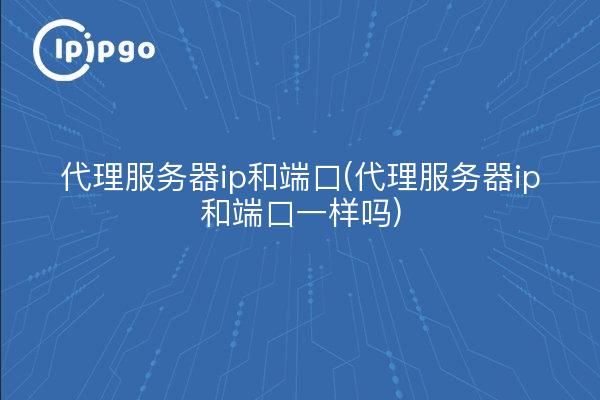
Is the proxy server ip and port the same?
Before discussing how proxy servers work, let's understand the ip and port of a proxy server. Proxy server ip and port are network addresses and port numbers used for proxy services, and they help users to have anonymous access and privacy on the Internet. So, are proxy server ip and port the same? Next, we will explore this question in depth.
Proxy server ip
The ip address of a proxy server is the unique identification of the proxy server in the network, which is similar to our home address on the Internet. When users access the Internet, they can hide their real ip through the proxy server's ip address to realize anonymous access and encrypted data transmission. Different proxy servers have different ip addresses, users can choose the right proxy server to connect according to their needs.
In practice, users can program or configure their browsers to set the proxy server ip address to realize functions such as anonymous access and breaking through regional restrictions. The following is a simple Python example that demonstrates how to make a network request via a proxy server ip address:
"`ipipgothon
import requests
proxy_ip = '123.456.789.10' # proxy server ip address
proxy_port = 8888 # proxy server port number
proxy = {
'http': f'http://{proxy_ip}:{proxy_port}',
'https': f'https://{proxy_ip}:{proxy_port}'
}
response = requests.get('https://www.example.com', proxies=proxy)
print(response.text)
“`
By setting the ip address and port number of the proxy server, users can realize proxy access and data transmission in network requests to protect privacy and break through network restrictions.
Proxy server port
The port number of a proxy server is the port identification of a proxy service in network communication, which is similar to our door number on the Internet. When users communicate with a proxy server, they can identify the specific function and service type of the service by the port number of the proxy server. Different proxy servers may open different port numbers for users to connect, common port numbers include 80, 8080, 3128, etc.
When choosing a proxy server, users need to pay attention to whether the port number of the proxy server meets their needs. Some proxy servers may restrict access to specific port numbers, and users need to configure them accordingly when connecting. The following is a simple Java example that demonstrates how to communicate over the network via a proxy server's port number:
"`java
import java.net.
public class ProxyExample {
public static void main(String[] args) throws Exception {
String proxyIp = "123.456.789.10"; // proxy server ip address
int proxyPort = 8888; // proxy server port number
Proxy proxy = new Proxy(Proxy.Type.HTTP, new InetSocketAddress(proxyIp, proxyPort));
URL url = new URL("https://www.example.com");
HttpURLConnection connection = (HttpURLConnection) url.openConnection(proxy);
connection.setRequestMethod("GET");
// Initiate web requests and process responses
// …
}
}
“`
By setting the port number of the proxy server, users can communicate with the proxy server on the network and realize functions such as data transmission and access control.
summarize
Proxy server ip and port are important identifiers of proxy service, they are used for anonymous proxy of network address and communication port identification respectively. In practical applications, users can choose the appropriate proxy server ip and port according to their needs, and program or configure them for network connection and data transmission. I hope this article is helpful for proxy server ip and port, welcome to stay tuned.








